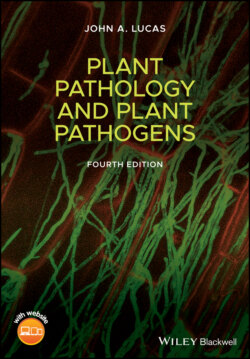Читать книгу Plant Pathology and Plant Pathogens - John A. Lucas - Страница 15
Damage or Disease?
ОглавлениеIt can be argued that short‐term harmful effects on plants, such as injury due to grazing, do not constitute disease. Indeed, some plants, such as the grasses, are well adapted to regular grazing and respond with increased growth if so affected. In cases where damage is sustained over a longer period of time, such as progressive destruction of roots by migratory nematodes or distortion of aerial shoots by exposure to persistent herbicides, the outcome is clearly within the scope of pathology. However, these fine distinctions are of limited use in arriving at a working definition of disease. Such a definition will depend in part on the situation in which it is intended to be used. For example, the biochemist may well be concerned with a malfunction involving a single enzyme and hence view disease as a specific metabolic lesion, whereas the farmer is normally only interested in changes which affect the overall performance of the crop and reduce its value.
Although at present, definitions of disease lack precision, it may ultimately be possible to describe all malfunctions in terms of biochemical changes. To date, this has been achieved in only a few exceptional cases, notably in diseases caused by fungi which produce host‐specific toxins, where all the symptoms are due to a single toxic compound acting at a specific target site (see Chapter 8).
